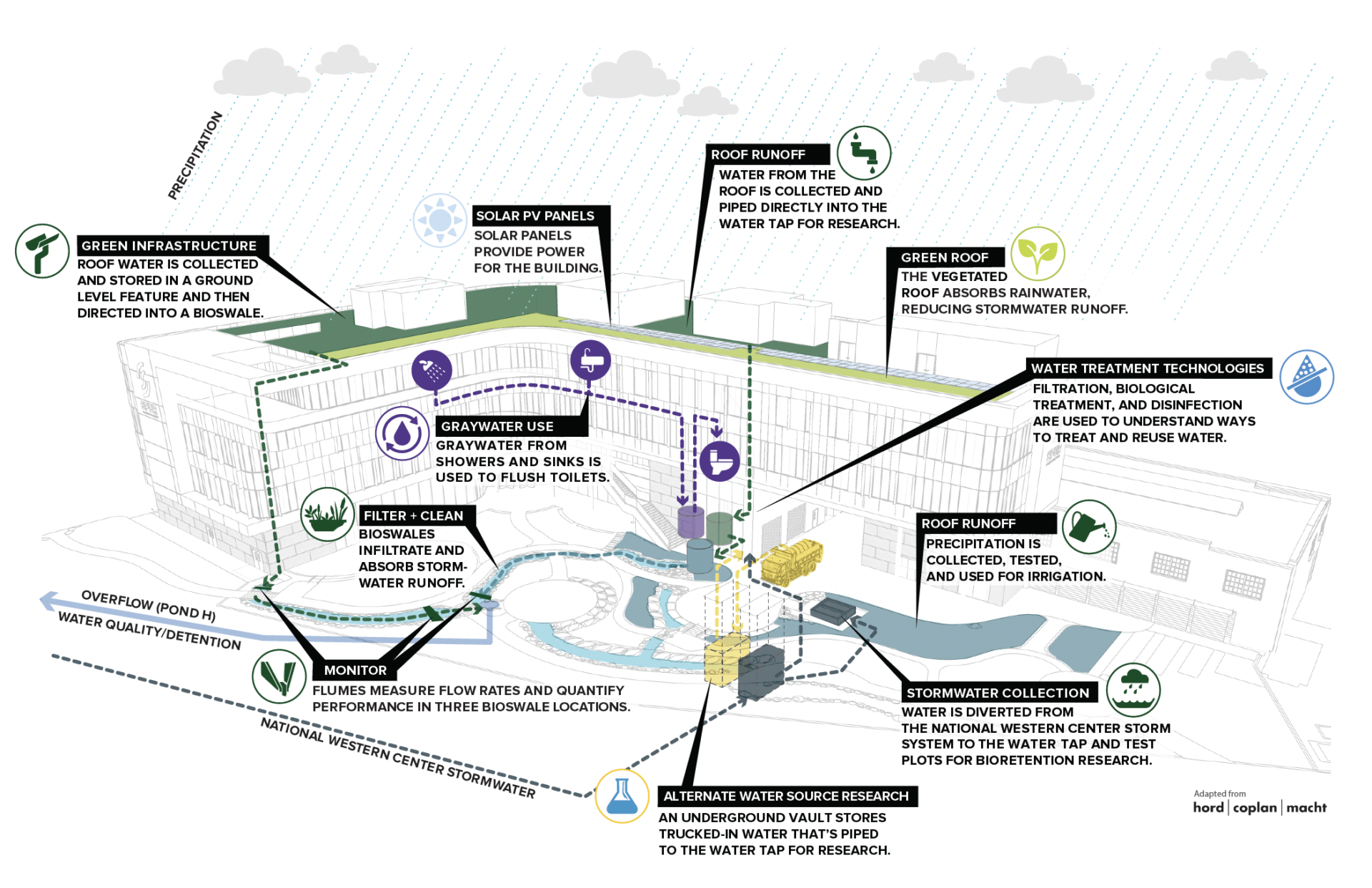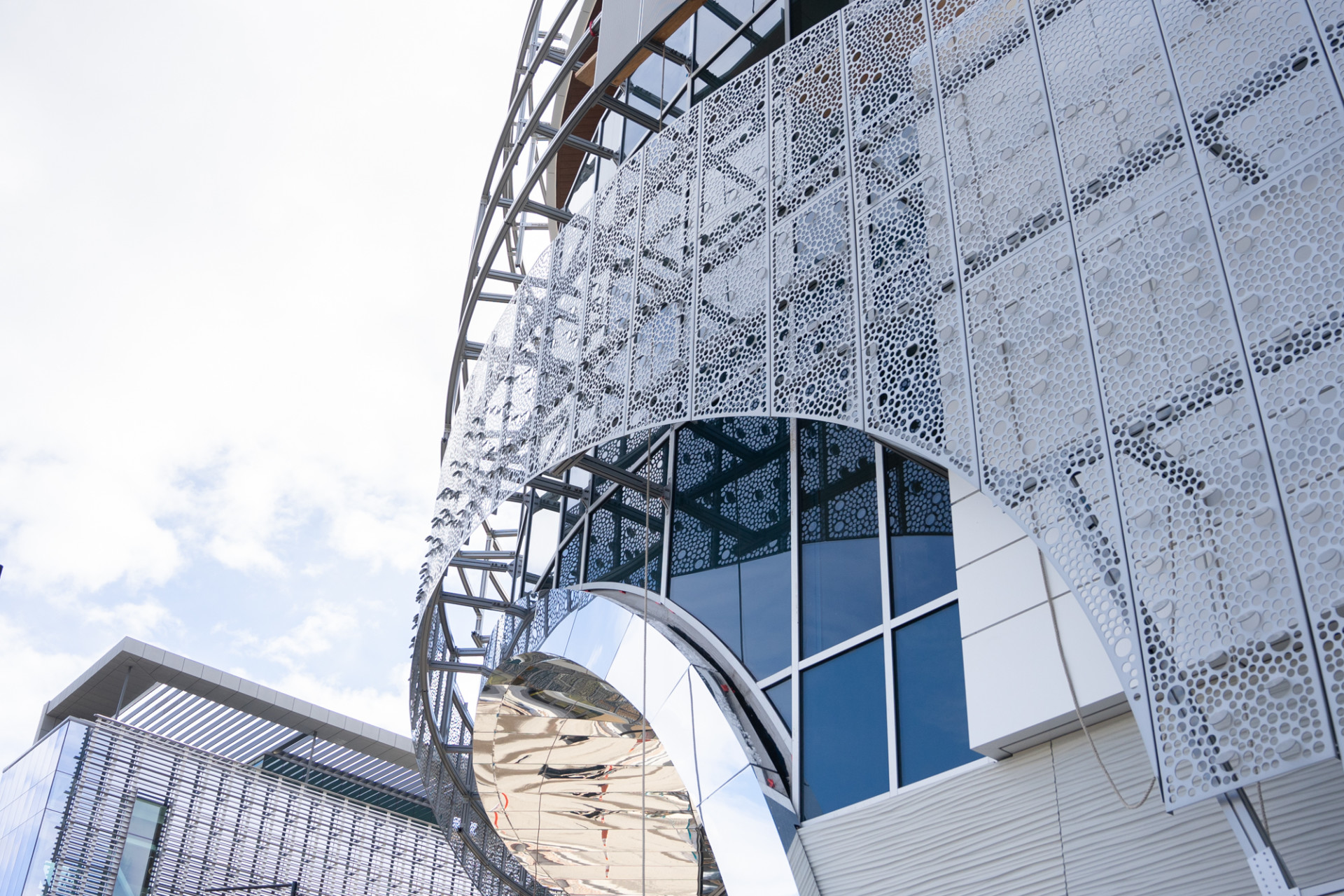
The Hydro building at CSU Spur will open on Jan. 6.
On one level, the opening of CSU Spur’s Hydro building on Jan. 6 represents the launch of a new engine of invention and innovation relating specifically to water. In addition to housing Denver Water’s new water quality lab, the building will be home to a range of programs and initiatives focused on developing new technologies and approaches to conserve, protect, and monitor precious water resources.
Yet, the completion of Hydro also marks the culmination on a decade-long process to imagine and create the CSU Spur campus in Denver, a place where new possibilities for education, research, and engagement can be found in the mingling of disciplines and approaches relating to water, food, and health.
Mazdak Arabi, director of Colorado State University’s One Water Solutions Institute (OWSI), mentioned both levels of convergence as he described initiatives that he and colleagues at the institute are bringing to Hydro. Arabi will be focused on the Institute’s Smart Water Software Solutions initiative, which aims to enable planners, engineers, and water managers to support sustainable operations and development through the use of its software tools.
“At the Spur campus, our focus will be on building partnerships with research entities and the private sector to market these solutions and improve our reach, not only in Colorado, but nationally and internationally,” said Arabi, who is also a professor in CSU’s department of civil and environmental engineering. Yet the overlap of concerns relating to water availability, agriculture, and urban development, he continued, makes the CSU Spur campus, with its focus areas, even more appealing for its potential as an “innovation ecosystem.”

Hydro’s design will provide researchers with access to water from multiple sources.
CSU Spur is part of the National Western Center, a redevelopment of the historic grounds of the National Western Stock Show in north Denver. Construction of the campus was funded in 2015 with $200 million from the state legislature, and the first building, Vida, which means “life” in Spanish and centers on programs relating to animal and human, opened on Jan. 7 of year.
The campus’s second building, Terra, which is Latin for “earth,” opened June 9 and offers a range of programs focused on agriculture and food production. Now the campus’s final building, Hydro, which is Greek for “water” is poised to open almost exactly a year after Vida opened its doors.
Hydro will be the campus’s largest building, and it will continue opening windows into career and research possibilities for preK-12 students, area residents, and other visitors. Denver Water’s new water quality laboratory, for example, will give people a chance to see and understand the testing and treatment procedures aimed at ensuring the safety of the region’s water supply.
The building will open at a time when persistent drought conditions in Colorado and across much of the western United States make the need for new approaches to conserve and protect water ever more apparent.
“Hydro provides the opportunity for CSU researchers and scholars, Denver Water professionals, municipalities, and industry partners to co-create solutions to the water challenges we are facing,” said Jim Bradeen, CSU’s associate vice president for CSU Spur strategy. “Enabling co-location, collaboration and serendipitous discovery is core to CSU Spur, and this campus is poised to deliver true innovation for the state of Colorado.”

A closer look at Hydro’s distinctive design.
In addition to housing CSU programs and initiatives, Hydro will provide space for nonprofit organizations focused on water and water education, and it will connect visitors to Western water issues through educational exhibits and rotating programming. A flexible theatre space will serve as a venue for various performances and events, and it will also allow the annual CSU Spur Water in the West Symposium to be hosted on site.
Hydro will also feature the campus’s second research green roof, this one exploring rooftop agrivoltaics, or how solar panels can accompany, and even support, urban agriculture efforts.
The green roof is one of many ways Hydro’s design, and that of the Spur campus, will support research and innovation. The Water Technology Acceleration Platform, or Water TAP, is another program of the One Water Solutions Institute, and it will take advantage of having access at Hydro to water from multiple sources, including rainwater from the building’s roof, graywater from its showers and sinks, stormwater from the grounds of the National Western Center, and treated wastewater.

Nikki Pike installs her artwork in the Hydro “backyard.” Crescendo is one of eight large-scale art installations at CSU Spur.
Sybil Sharvelle, director of Water TAP and a CSU professor of civil and environmental engineering, talked about the significance of having access to these water sources within a space that will bring researchers together with technology developers from the both the private and public sectors. The goal is to assess the quality of water from different sources and then to treat it, as necessary, for differing “fit-for-purpose” uses.
New technologies, including approaches using biological systems, ultraviolet light, or filtration, could make it safe to use less-than-pristine water for a range of uses, from irrigating fields to flushing toilets. After testing these technologies, Sharvelle said, the plan is to take the next step: “There’s definitely a component that’s about demonstration and taking technologies from research-tier level to a higher level of commercialization.”
About CSU Spur
CSU Spur is a free educational year-round public destination in Denver focused on engaging PreK-12 students, families, and visitors around food, water, and health. CSU Spur is a non-degree granting campus that showcases the work of the CSU System campuses: CSU, CSU Pueblo, and CSU Global. Spur is built upon the land-grant mission of access to education and the belief that students can be anything they want to be. To inspire students and visitors to engage in important world issues, CSU Spur will bring together scientists to collaborate, put science on-display, and showcase career paths. The CSU Spur campus provides immersive learning experiences and cutting-edge research across three buildings: Vida, Terra, and Hydro. Learn more at CSUSpur.org.
About Denver Water
Denver Water proudly serves high-quality water and promotes its efficient use to 1.5 million people in the city of Denver and many surrounding suburbs. Established in 1918, the utility is a public agency funded by water rates, new tap fees and the sale of hydropower, not taxes. It is Colorado’s oldest and largest water utility. Subscribe to TAP to hydrate your mind, and follow us on Facebook, Twitter, and Instagram.